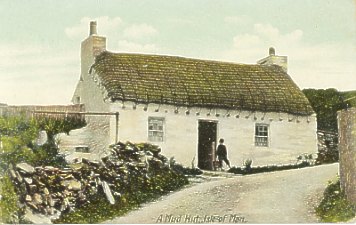These maps show a clear correlation between crop choice and political complexity. Societies that grew grain tended to have more hierarchical political systems -- empires, even -- like the rice- and wheat-cultivating kingdoms of ancient India. Tuber crops were associated with smaller, more local political units.
1 posted on
05/23/2016 4:55:48 AM PDT by
SunkenCiv
To: SunkenCiv
Yum.
Fried Potatoes: French fries and potato chips contain a toxin called acrylamide, a chemical used to produce plastics and dyes. Acrylamide causes DNA damage, which can result in reproductive damage and cancer.
When starchy foods are heated to high temperatures, they spontaneously form acrylamide, even though none was present in the raw ingredients. Both American and European scientists agree that the foods with the highest levels of acrylamide include french fries and potato chips.
Additionally, deep fried foods are high in liver-toxic lipid peroxides (rancid fats, which are immuno-suppressive and damage liver cell membranes) and trans-fatty acids (which suppress the production of PGE1, an important liver-protecting prostaglandin).
3 posted on
05/23/2016 5:03:39 AM PDT by
petercooper
(All the world's problems are caused by the sandrats, hoodrats, gimmedats, democrats and commiecrats.)
To: SunkenCiv
Looks like hardly anyone had to eat their vegetables....
4 posted on
05/23/2016 5:07:15 AM PDT by
Paladin2
(Live Free or Die.)
To: SunkenCiv
Off topic I know, but Michigan potatoes are the best.
9 posted on
05/23/2016 5:24:43 AM PDT by
stayathomemom
(Beware of kittens modifying your posts.)
To: SunkenCiv
[the Curse of the Potato]If it wasn't for the Irish potato (famine), I'd probably be living in a house with a thatched roof.
17 posted on
05/23/2016 5:52:20 AM PDT by
oh8eleven
(RVN '67-'68)
To: SunkenCiv
In my class (that I used to teach) I dealt with food and early military power and intuitively KNEW Jared Diamond was wrong-—but didn’t have specific evidence. This is it. Victor Hanson is right, it is culture not “luck.”
18 posted on
05/23/2016 5:53:42 AM PDT by
LS
("Castles Made of Sand, Fall in the Sea . . . Eventually" (Hendrix))
To: SunkenCiv
Because of the potato (and the associated Irish famine) there are less people living in Ireland today than there was in 1840.
The population of Europe 'exploded' with the introduction of the potato.
20 posted on
05/23/2016 5:56:41 AM PDT by
blam
(Jeff Sessions For President)
To: SunkenCiv
The theory is not ironclad, of course. One problem is that most tuber-growing societies lived in the tropics, where there was also endemic disease that slowed the growth of complex civilizations. Anthropologists also point out that to the best of our knowledge, tubers were domesticated thousands of years after cereals, so societies that grew grains had a head start. It also ignore the role of seasons in middle latitudes. In climates with long cold winters people are forced to plan ahead. They have a limited time to do everything they need to do to survive half the year of winter and early spring when nothing much is available to eat. They have to harvest and store large quantities of not just crops, but fuel and fodder to get them and their livestock through winter. They have to slaughter most of their livestock, only keeping the best animals for breeding. They have to prepare and store that meat by salting, smoking, drying or pickling it. And if they don't they die. That demands a level of planning and organization that isn't there if food is available to harvest all year round, and the weather is always moderate.
27 posted on
05/23/2016 6:11:40 AM PDT by
Hugin
(Conservatism without Nationalism is a fraud.)
To: SunkenCiv
I started taking a couple of tablespoons of this every day, unmodified and unheated, and I immediately noticed a difference in my gastric system for the good.

32 posted on
05/23/2016 6:39:16 AM PDT by
Abathar
(Proudly posting without reading the article carefully since 2004)
To: SunkenCiv
The argument depends on the differences between how grains and tubers are grown. Crops like wheat are harvested once or twice a year, yielding piles of small, dry grains. These can be stored for long periods of time and are easily transported — or stolen.
Root crops, on the other hand, don’t store well at all. They’re heavy, full of water, and rot quickly once taken out of the ground. Yuca, for instance, grows year-round and in ancient times, people only dug it up right before it was eaten. This provided some protection against theft in ancient times.
interesting proposition that grains advance a people but tubers hold back....... but they seem to miss what I think would be the obvious reason....
in describing grains how it can be stored and transported they’re describing something that’s inherently economically “liquid” like cash.... versus the the tubers
36 posted on
05/23/2016 7:40:19 AM PDT by
tophat9000
(King G(OP)eorge III has no idea why the Americans are in rebellion... teach him why)
To: SunkenCiv
I dunno - there's a lot to be said for the noble tuber:

But then there's a lot to be said for grain products too:

I mean, civilization, right?
To: SunkenCiv
Reminds me of grammar school word problems:
If 20 persons working 6 hours a day for a month could plant enough yuca to provide cassava bread for a village of 300 persons for 2 years, how many people working 8 hours a day for 3 weeks would it take to feed 475 people for 15 months?
57 posted on
05/23/2016 5:08:29 PM PDT by
ApplegateRanch
(Love me, love my guns!�)
To: SunkenCiv
Nonsense. The potato wasn’t cultivated in these countries before 1700.
The cultures preceeded the potato.
61 posted on
05/23/2016 10:13:37 PM PDT by
LadyDoc
(liberals only love politically correct poor people..)
FreeRepublic.com is powered by software copyright 2000-2008 John Robinson





